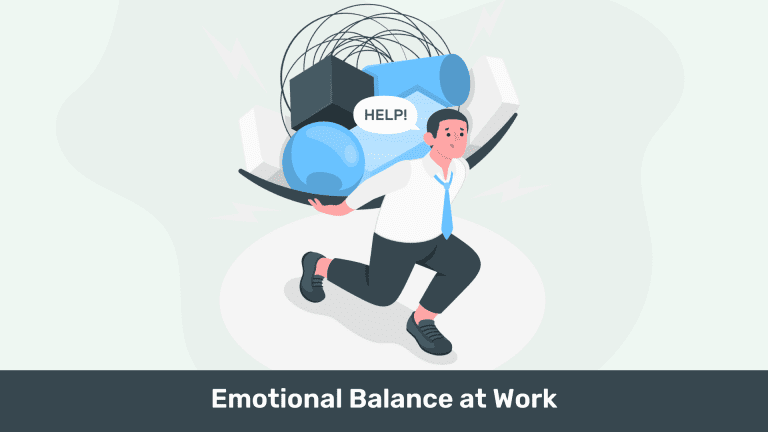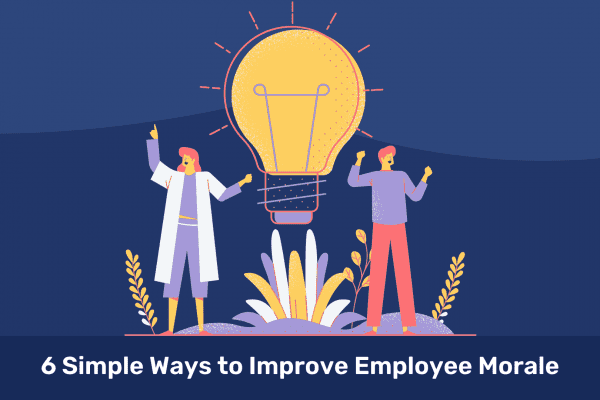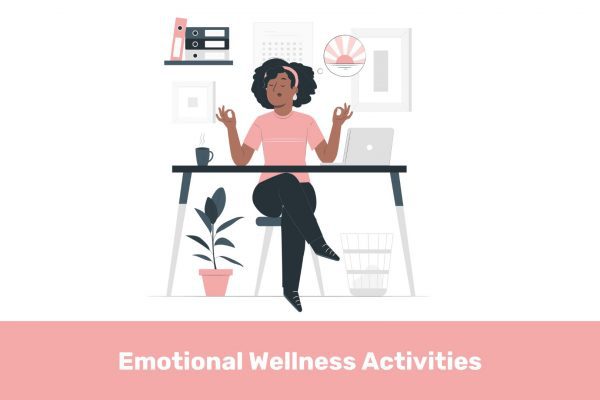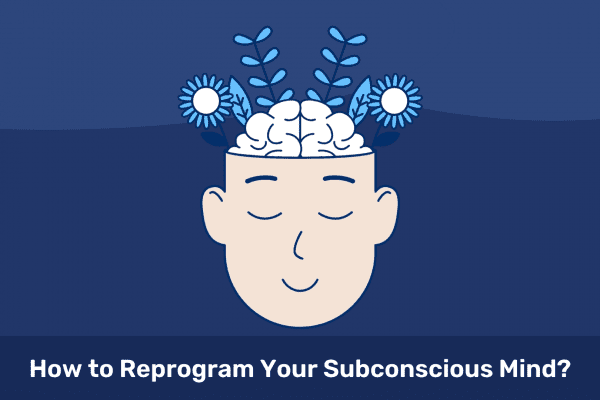Introduction
In today’s bustling and highly competitive work environments, achieving and maintaining emotional balance has become not just a desirable trait but a crucial necessity for individual well-being and overall productivity. The ability to navigate the intricate web of emotions that accompany professional life isn’t just a matter of personal resilience; it profoundly influences the success and efficiency of entire teams and organizations.
Consider these compelling statistics: studies conducted by the American Institute of Stress reveal that 83% of workers in the United States suffer from work-related stress, leading to decreased productivity and increased absenteeism. They have also reported that stress costs U.S. businesses approximately $300 billion annually due to issues related to job turnover, absenteeism, and decreased productivity.
Emotional imbalance not only affects individuals but also ripples throughout the workplace, impacting team dynamics, decision-making, and ultimately, the company’s bottom line.
The importance of emotional balance at work cannot be overstated. It’s not merely a personal endeavor but a cornerstone of a thriving, effective, and dynamic work culture. This exploration aims to delve into the art of equilibrium in the workplace, offering insights, strategies, and practical steps to not only survive but thrive amidst the ever-changing landscape of professional life.
What is Emotional Balance?
Emotional balance refers to the ability to manage and regulate one’s emotions effectively, both in response to internal and external stimuli. It involves maintaining a state of equilibrium where neither excessive negative emotions (such as anger, stress, or anxiety) nor excessive positive emotions (such as overconfidence or excitement) disrupt an individual’s overall well-being or hinder their decision-making. Emotional balance is not about suppressing emotions but about recognizing and processing them in a healthy manner.
Emotionally balanced individuals are better equipped to handle the challenges and pressures of life, including those encountered in the workplace. They exhibit a range of emotional intelligence competencies, such as self-awareness, self-regulation, empathy, and effective interpersonal relationships. Emotional balance empowers individuals to make more thoughtful and rational decisions, respond to stressors with resilience, and maintain a positive and constructive attitude.
The Importance of Emotional Balance in the Workplace
Emotional balance in the workplace is of paramount importance for several reasons:
- Employees with emotional balance tend to be more productive and focused. They can concentrate on their tasks, make informed decisions, and work efficiently without being overwhelmed by negative emotions.
- It fosters healthy interpersonal relationships, reducing conflicts and enhancing teamwork. Colleagues who can understand and manage their emotions are better equipped to resolve disputes amicably.
- Leaders who exhibit emotional balance are more effective in guiding their teams. They inspire trust and confidence, making it easier for team members to follow their lead.
- It helps individuals cope with workplace stressors. This, in turn, decreases the risk of burnout and improves overall well-being.
- In a rapidly changing work environment, emotionally balanced individuals are more adaptable and open to change. They can navigate uncertainties and challenges with resilience.
- It extends beyond the internal workplace. Professionals who interact with clients and customers can provide better service by understanding and addressing their emotions and needs effectively.
Understanding Emotions in the Workplace
Recognizing Common Workplace Emotions:
Understanding emotions in the workplace begins with the recognition of the common emotional states that employees experience. These emotions can be diverse and complex, and recognizing them is essential for fostering a positive and productive work environment. Here are some of the common workplace emotions:
- Happiness: Employees who feel happy are more likely to be engaged, creative, and motivated. Recognizing and appreciating moments of happiness can boost morale and teamwork.
- Stress: Stress is a prevalent emotion in the workplace. Recognizing stress in oneself and colleagues is crucial for addressing its root causes and implementing stress-reduction strategies.
- Frustration: Frustration can arise from various sources, such as challenging tasks or interpersonal conflicts. Acknowledging frustration allows for problem-solving and prevents it from escalating.
- Anger: Employees may experience anger due to perceived injustices or conflicts. Recognizing anger is essential for addressing and resolving issues before they lead to more significant problems.
- Anxiety: Anxiety can result from uncertainty, high-pressure situations, or fear of failure. Identifying anxious colleagues can help provide support and create a more empathetic work environment.
- Enthusiasm: Recognizing enthusiasm in oneself and others is important for leveraging it to drive innovation and creativity within the organization.
- Sadness: Employees may encounter personal or work-related challenges that lead to sadness. Acknowledging and offering support to those experiencing sadness is vital for their well-being.
- Empathy: Empathy is a positive emotion that can improve team dynamics. Recognizing empathetic colleagues and encouraging empathy can enhance cooperation and collaboration.
The Impact of Emotions on Performance and Well-being:
Emotions have a profound impact on both an individual’s performance and overall well-being in the workplace. Here’s how emotions can influence these aspects:
- Performance: Emotions can either enhance or hinder an employee’s performance. Positive emotions like enthusiasm and happiness can boost productivity and creativity, while negative emotions like stress and anxiety can impede performance. Understanding the relationship between emotions and performance helps employees and organizations take appropriate action.
- Well-being: Emotional well-being is closely tied to overall well-being. Constant stress, frustration, or anxiety can lead to burnout and negatively affect an employee’s mental and physical health. Recognizing the signs of emotional distress can enable the organization to provide resources and support for maintaining well-being.
- Interpersonal Relationships: Emotions play a significant role in interpersonal dynamics. Positive emotions can foster cooperation and teamwork, while negative emotions can lead to conflicts and strained relationships. Recognizing and managing emotions is essential for maintaining a harmonious work environment.
The Role of Self-Awareness in Achieving Emotional Balance at Work:
A. Assessing Your Own Emotions:
Self-awareness is the foundation of emotional intelligence and plays a crucial role in achieving and maintaining emotional balance at work. Assessing your own emotions involves a deep and honest introspection into your feelings and their impact on your thoughts, behaviors, and interactions in the workplace. Here’s a more detailed look at this process:
- Emotion Identification: Begin by identifying and naming your emotions accurately. Often, we experience a complex mix of feelings that can be challenging to discern. Are you feeling stressed, anxious, frustrated, or overwhelmed? The ability to pinpoint your emotions provides clarity and a starting point for self-awareness.
- Journaling: Keeping an emotional journal can be a helpful tool. Regularly recording your feelings and the situations that trigger them can reveal patterns and trends. Over time, you may notice that certain events or individuals consistently elicit specific emotional responses.
- Physical Awareness: Pay attention to how your body responds to emotions. Emotions are not just mental experiences but also physical sensations. For instance, stress might manifest as tension in your shoulders or a racing heart. Recognizing these physical cues can help you identify emotions as they arise.
B. Recognizing Emotional Triggers:
- Identifying Triggers: Emotional triggers are events, situations, or individuals that provoke specific emotional reactions. They can be internal (such as a fear of failure) or external (like a demanding deadline or a difficult colleague). Recognizing your triggers is essential because it allows you to prepare and respond more effectively.
- Patterns and Associations: Explore patterns and associations between triggers and emotional responses. For example, you might notice that you consistently become frustrated when working with a particular team member or when faced with tight deadlines. Recognizing these patterns empowers you to anticipate and manage your emotions.
- Mindfulness Practices: Engaging in mindfulness practices, such as meditation or deep breathing exercises, can help you become more attuned to your emotional triggers. These practices provide a mental space that allows you to observe your emotions without immediate reactivity, giving you greater insight into what causes them.
C. Strategies for Increasing Self-Awareness:
- Feedback and Assessment: Seek feedback from colleagues, friends, or mentors. They can provide valuable perspectives on your emotional tendencies that you might not be aware of. Additionally, consider using self-assessment tools or emotional intelligence assessments to gain a more objective understanding of your emotional strengths and weaknesses.
- Self-Reflection: Dedicate time for regular self-reflection. Think about your daily interactions and experiences, and ponder how your emotions influenced your decisions and relationships. This practice can help you become more in tune with your emotional responses over time.
- Professional Help: If you find it challenging to increase your self-awareness on your own, consider seeking guidance from a therapist or a coach. They can offer expert insights and techniques tailored to your specific needs.
Self-awareness is the cornerstone of emotional balance at work. By assessing your own emotions, recognizing emotional triggers, and employing strategies to enhance your self-awareness, you can gain a deeper understanding of your emotional landscape and develop the skills needed to navigate the complex world of work with greater equilibrium and success.
Interpersonal Relationships and Emotional Balance
Interpersonal Relationships and Emotional Balance play a pivotal role in creating a harmonious and productive work environment. Let’s delve into each aspect in detail:
Effective Communication:
Effective communication is the cornerstone of building and maintaining positive interpersonal relationships and emotional balance in the workplace. It involves the clear, open, and respectful exchange of ideas, information, and feedback between colleagues. Here’s a detailed exploration of this critical component:
- Clear and Open Communication: When colleagues communicate clearly and openly, misunderstandings and misinterpretations are minimized. This leads to greater trust and transparency among team members, fostering emotional balance.
- Active Listening: Active listening is a fundamental part of effective communication. It shows respect for your colleagues and allows you to fully understand their perspectives and concerns. It helps in preventing and resolving conflicts by addressing issues early.
- Constructive Feedback: Providing and receiving constructive feedback is an essential part of professional growth. Constructive feedback should be specific, actionable, and delivered with empathy to avoid damaging relationships.
- Non-Verbal Communication: Non-verbal cues, such as body language and tone of voice, are equally important in effective communication. Being mindful of these cues can help convey the intended message and avoid miscommunication.
- Emotional Intelligence: Understanding and managing one’s emotions, as well as being attuned to the emotions of others, is a key aspect of effective communication. Emotional intelligence helps in empathizing with colleagues and adapting communication to their emotional state.
Conflict Resolution and Emotional Balance:
Conflicts are an inevitable part of any workplace, but how they are handled can significantly impact emotional balance. Here’s a detailed look at conflict resolution and its relationship with emotional balance:
- Conflict Identification: Recognizing and addressing conflicts early is essential. Ignoring or avoiding conflicts can lead to emotional turmoil and strained relationships. Encouraging open communication allows conflicts to surface and be addressed promptly.
- Collaborative Problem-Solving: Instead of a win-lose approach, a collaborative problem-solving method can help maintain emotional balance. Encourage parties involved in a conflict to work together to find mutually acceptable solutions.
- Active Mediation: In cases where conflicts are particularly challenging, it can be beneficial to involve a neutral third party to mediate and guide the resolution process. This can help ensure fairness and objectivity.
- Emotional Regulation: Emotional regulation is vital during conflict resolution. Teaching employees how to manage their emotions, stay calm, and express themselves respectfully is a crucial aspect of maintaining emotional balance.
- Learning from Conflicts: Conflicts can also be learning opportunities. After resolving a conflict, it’s essential to reflect on what caused it and what can be done to prevent similar conflicts in the future.
Building Positive Work Relationships:
Positive work relationships are built on trust, mutual respect, and a supportive environment. They are a key element of emotional balance in the workplace. Here’s a closer look at building and nurturing these relationships:
- Trust and respect are the foundations of positive work relationships. When colleagues trust each other, they feel safe to share ideas, concerns, and collaborate effectively.
- Offering support and showing empathy for your colleagues during both professional and personal challenges is essential. It strengthens the bonds between team members and contributes to emotional balance.
- Team-building activities can be a fun and effective way to foster positive work relationships. These activities encourage collaboration, communication, and camaraderie among team members.
- Encouraging mentorship and coaching within the workplace can help employees learn from one another and develop positive relationships. It promotes knowledge sharing and growth.
- Acknowledging and appreciating the efforts and contributions of colleagues is a powerful way to build positive work relationships. It boosts morale and motivates individuals to perform at their best.
Creating a Supportive Work Environment
Creating a Supportive Work Environment is a critical component of achieving emotional balance at work. This entails various aspects, including the role of leadership in fostering emotional balance, team building and collaboration, and promoting well-being initiatives. Let’s delve into each of these components in detail:
Leadership’s Role in Fostering Emotional Balance:
In any organization, leadership sets the tone for the workplace culture. Leaders play a pivotal role in creating an environment where emotional balance can thrive. Here’s how:
- Effective leaders model emotional intelligence and self-awareness. They show empathy, active listening, and emotional resilience, inspiring their teams to follow suit.
- Encouraging open and honest communication is crucial. Leaders should create an atmosphere where employees feel comfortable sharing their thoughts, concerns, and emotions without fear of retribution.
- Leaders should be proactive in identifying workplace stressors and addressing them. Whether it’s workload, unrealistic expectations, or interpersonal conflicts, leaders must take steps to mitigate these stressors and create a healthier work environment.
- Providing emotional intelligence training and stress management programs for both leaders and employees can be highly beneficial. These programs can enhance emotional intelligence and equip individuals with the tools to manage emotions effectively.
- A supportive leadership style involves offering constructive feedback, mentorship, and recognition for a job well done. When employees feel supported and valued, they are more likely to experience emotional balance.
Team Building and Collaboration:
Team dynamics significantly influence emotional balance. Building a cohesive and collaborative team can enhance emotional well-being in the workplace:
- Team-building activities that focus on trust, respect, and communication can foster stronger relationships among team members, reducing the likelihood of conflicts and misunderstandings.
- Encouraging collaboration and teamwork on projects can create a sense of belonging and shared accomplishment, contributing to emotional balance.
- Teams should be equipped with conflict resolution skills to address disputes in a healthy, constructive manner. Effective conflict resolution prevents emotional turmoil from escalating.
- Inclusive teams that respect and celebrate diversity can lead to a more inclusive and emotionally balanced work environment, as employees feel valued and respected for their unique contributions.
How to Achieve Emotional Balance?
Mindfulness and Meditation:
In the fast-paced world of work, finding moments of tranquility and self-awareness can be a game-changer. Mindfulness and meditation are powerful tools to help you stay centered and emotionally balanced:
- Mindfulness Practices: Learn to be fully present in the moment, whether it’s during a crucial meeting or while tackling a challenging task. Mindfulness helps you manage stress by grounding you in the here and now.
- Meditation: Incorporate short meditation sessions into your daily routine. Even just a few minutes of focused breathing can provide clarity and reduce stress levels. Meditation can also enhance your ability to regulate your emotions.
- Mindful Breathing: Deep, intentional breaths can calm your nervous system and help you respond to challenging situations with more composure.
Time Management and Work-Life Balance:
Efficient time management is essential for achieving emotional balance, as it allows you to dedicate time to both work and personal life without feeling overwhelmed:
- Prioritization: Identify your most important tasks and allocate your time accordingly. This prevents overloading yourself with work and promotes a sense of control.
- Time Blocking: Create a schedule that designates specific time for work, personal activities, and relaxation. Stick to your schedule to maintain a healthy balance.
- Healthy Boundaries: Learn to say no when necessary. Setting boundaries with colleagues and supervisors can prevent work from encroaching on your personal life, reducing stress and emotional strain.
Setting Boundaries:
Establishing clear boundaries at work is fundamental for emotional balance. It protects your personal time and fosters respect within the workplace:
- Clearly communicate your boundaries to your colleagues and superiors. Let them know your availability and when you need focused, uninterrupted work time.
- Set specific times for checking and responding to work emails and messages. Avoid excessive after-hours communication to protect your personal time.
- Prioritize self-care by setting boundaries for taking breaks, exercising, or simply disconnecting from work-related concerns. Your well-being is vital to maintaining emotional balance.
- Be consistent in enforcing your boundaries. This not only helps you but also sets a positive example for your coworkers.
By integrating these strategies into your professional life, you can achieve and maintain emotional balance, resulting in increased resilience, improved well-being, and enhanced productivity at work.
Final Thoughts
Emotional balance at work is not just a nice-to-have; it’s a vital component of success and overall well-being. It empowers individuals to navigate the challenges of the professional world with resilience and poise, fostering a healthier work environment and bolstering personal growth.
But achieving emotional balance can be a journey that requires the right resources and support. That’s where Woliba steps in. Our extensive wellness resources library is a comprehensive guide to help you on your path to emotional equilibrium. From informative articles on stress management and emotional intelligence to energizing fitness videos and delectable, nutritious recipes, we provide a wide array of tools to enhance your emotional well-being.
Contact us now to explore our wellness library and start your journey to a more harmonious, productive, and fulfilling work life. Your emotional well-being is our priority, and we’re here to support you every step of the way.





